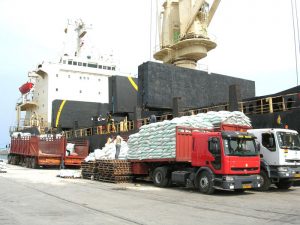The Ministry of Food and Agriculture (MoFA) is working on the establishment of a Grain Development Authority to address current food price fluctuations in the country.
According to the sector minister, Dr Owusu Afriyie Akoto, the expectation was that the authority should be in place by the first quarter of 2022, explaining: “I am making a submission to Parliament and then go to the Cabinet for the creation of a Grain Development Authority.”
Speaking about complaints over food price hikes in an interview, he said 80,000-capacity warehouses had been handed over to him and he believed that such an authority could raise funds from the market to be able to stock the warehouses during the harvesting season.
He said the stocked food could be disbursed to stakeholders, such as poultry farmers and other processes when prices hit their peak.
Dr Afriyie Akoto was hopeful that such a step would help stabilize the huge differences in prices in the year, describing it as the only solution to the current food price fluctuations in the country.
He explained that since Ghana could not ban traders within the ECOWAS sub-region from buying from the country, the best solution was to resource the authority to compete effectively with the foreign buyers of our grains.
Buffer stock
Asked about the current National Buffer Stock Company, the minister said the company did not have the required muscle to stock all the grains produced by farmers.
He said currently Ghana produced three million metric tonnes of maize, and the situation was that only one million metric tonnes was moved from the farm gate to the market.
“So, to be able to affect the price, we should be able to buy at least 15% of that, which is about 100,000 metric tonnes.
“As we speak, even when we have enough money, we will not be able to stock these grains, but now we have these 80 warehouses with the capacity of 1,000 metric tonnes each, making a total of 80,000 metric tonnes,” the minister said.
He expressed concern about the fact that the balance sheet of the current buffer stock was not even enough to carry 10,000 tonnes, “but we need to be able to carry 10 times that”, hence the only solution would be the establishment of the authority.
Dr Afriyie Akoto explained that the current buffer stock would be part of the authority to make it more effective, stating that in 2017 when the current government took over, “there was no buffer stock”.
Neighbouring buyers
Speaking on foreign buyers from neighbouring countries, Dr Afriyie Akoto explained that arrangements were in place with the Ministry of Finance and the Ghana Revenue Authority to regulate the export of food crops.
He said as part of that, all those intending to export food crops were required to get permits from his office before embarking on such an exercise.
Dr Afriyie Akoto added that the ECOWAS free trade agreement made it possible for neighbouring countries to buy food items from the country, saying he was confident that if the process was well-coordinated, it could rake in more foreign exchange for the country.
The minister said if the foreign buyers were banned, farmers would not have any avenue to sell their produce, since, as of now, the Buffer Stock Company could not stock everything farmers produced, and that would be a disincentive to farmers.
Price hikes
The minister explained that the food price hikes currently being experienced were an annual pattern between July and September.
“Food prices in Ghana are seasonal following the pattern of the rainfall because most of our agriculture is rain-fed. Every year, before the harvest, prices are at their highest, and as the harvest comes in, prices start tumbling from October to January.
“We expect that they will reach the lowest level by December, which is what is expected every year,” Dr Afriyie Akoto explained.
He said the current situation of food price hikes could not be used to generalise the food situation in the country, stating that “until we are able to set up a proper buffer stock system, we will continue to face the same challenges year after year”.






